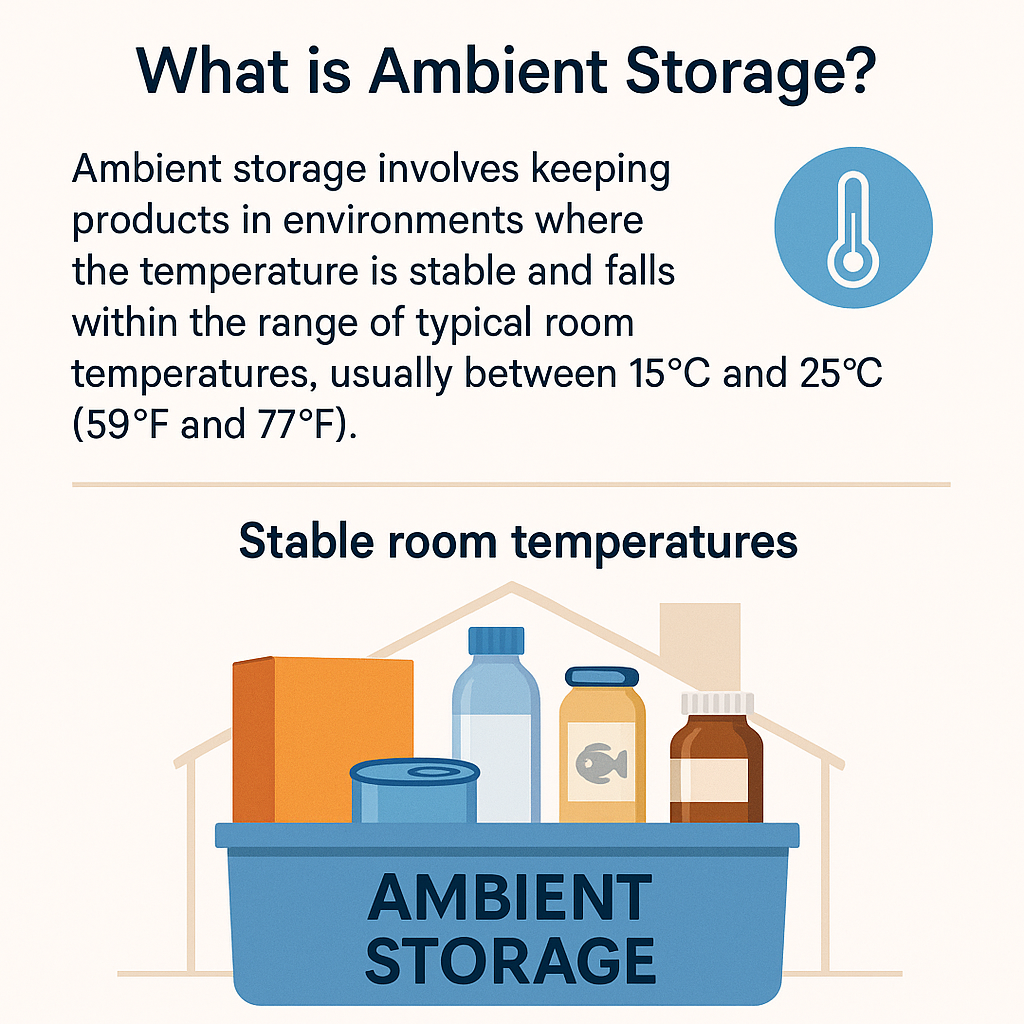Ambient Storage
What is Ambient Storage?
Ambient storage involves keeping products in environments where the temperature is stable and falls within the range of typical room temperatures, usually between 15°C and 25°C (59°F and 77°F). It is commonly used for goods that are not sensitive to temperature changes and do not need specific climate control, such as dry foods, household products, and certain pharmaceuticals.

Importance of Ambient Storage
Ambient storage plays a crucial role in maintaining the quality and safety of products that do not require refrigeration or freezing. It provides a stable environment with consistent room temperature. This type of storage helps prevent spoilage, degradation, and damage, ensuring products remain in optimal condition throughout their shelf life.
Benefits and Considerations of Ambient Storage
Ambient storage is a practical option for storing products that do not need refrigeration or freezing, offering several benefits while also requiring certain considerations. Here are the main factors to keep in mind:
Benefits:
- Cost-Effective: Ambient storage is generally less expensive than temperature-controlled options, reducing overall storage costs.
- Energy Efficiency: It requires minimal energy consumption, making it more sustainable and eco-friendly.
- Versatility: Suitable for a wide range of products, such as dry foods, canned goods, and non-perishable items.
- Simplified Management: Easier to maintain without the need for specialized temperature control equipment.
Considerations:
- Temperature Fluctuations: Ambient storage environments may still experience temperature changes, which can affect sensitive items.
- Humidity Control: Certain products may require specific humidity levels to prevent moisture damage or spoilage.
- Product Shelf Life: Items stored in ambient conditions should be monitored to ensure they remain within their optimal shelf life.
- Pest Control: Warehouses may need additional pest management measures to protect goods stored in ambient conditions.
Types of Products That Need Ambient Storage
Here are types of products that typically need ambient storage:
- Dry Foods: Items like grains, cereals, pasta, and canned goods that do not require refrigeration.
- Pharmaceuticals: Certain medications and medical supplies that remain stable at room temperature.
- Beverages: Non-perishable drinks such as bottled water, soft drinks, and shelf-stable juices.
- Household Goods: Products like cleaning supplies, paper goods, and toiletries.
- Electronics and Hardware: Devices and components that do not need special temperature control but still require protection from extreme conditions.
- Cosmetics and Personal Care Items: Makeup, lotions, and shampoos that are stable at room temperature.
Ambient storage vs Temperature-Controlled Storage
Choosing between ambient and temperature-controlled storage depends on product needs. Ambient storage suits stable items, while temperature-controlled storage is essential for sensitive products requiring specific temperature conditions.
Temperature Requirements:
- Ambient Storage: Maintains a stable room temperature, suitable for non-perishable products.
- Temperature-Controlled Storage: Regulates specific temperature ranges for items like frozen foods, pharmaceuticals, and sensitive chemicals.
Cost:
- Ambient Storage: More cost-effective due to minimal energy requirements.
- Temperature-Controlled Storage: Higher costs associated with refrigeration, freezing, or climate control systems.
Product Suitability:
- Ambient Storage: Ideal for dry foods, household goods, and stable pharmaceuticals.
- Temperature-Controlled Storage: Essential for perishable goods, temperature-sensitive medications, and certain electronics.
Energy Consumption:
- Ambient Storage: Consumes less energy, making it more sustainable.
- Temperature-Controlled Storage: Requires significant energy to maintain specific temperatures.
Risk of Spoilage or Damage:
- Ambient Storage: Some products may be vulnerable to temperature fluctuations or humidity.
- Temperature-Controlled Storage: Offers better protection against spoilage or damage for sensitive items.


.png)
